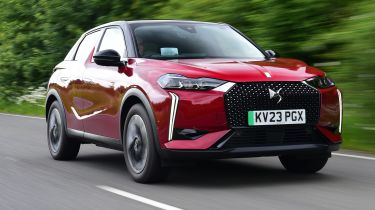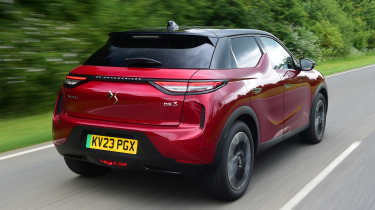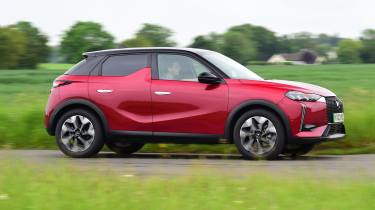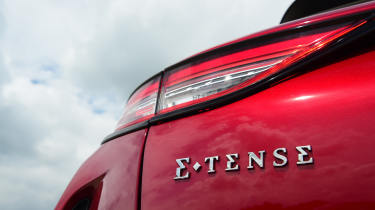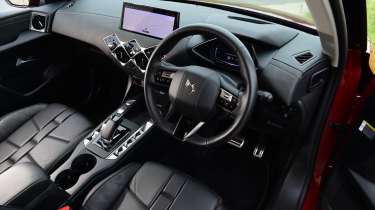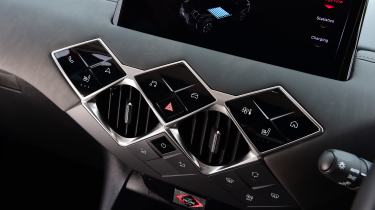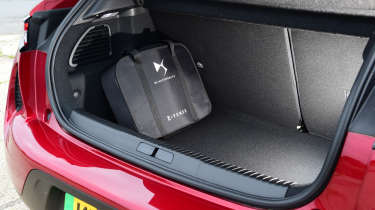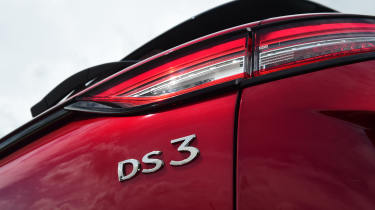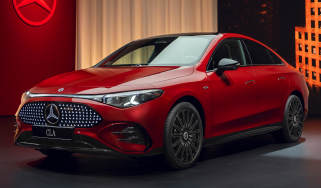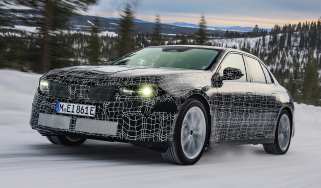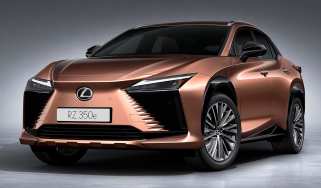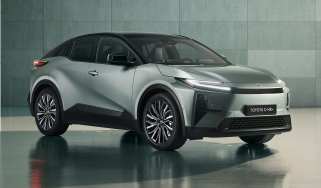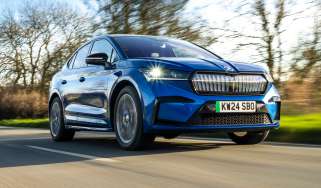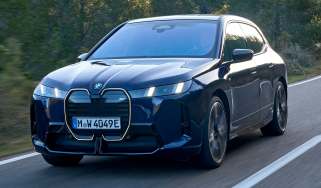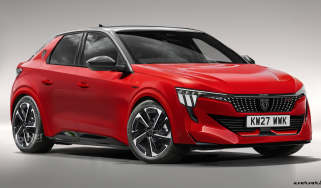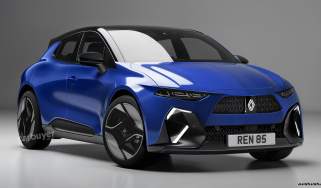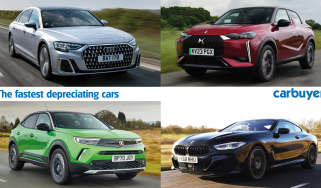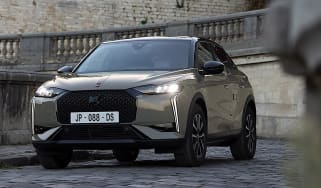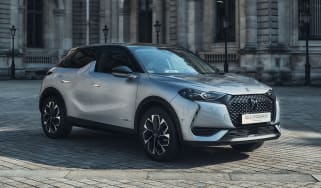DS 3 E-Tense review – premium French brand’s first EV
"The DS 3 E-Tense offers a longer range than before, but it's far from the best electric car on sale"
Pros
- Choice of trim levels
- Characterful design
- Fast-charging capability
Cons
- Shorter range than rivals
- Not a huge boot
- Feels heavy
Verdict – is the DS 3 E-Tense a good car?
The DS 3 E-Tense is a quiet, comfortable and reasonably luxurious small electric SUV that’s at home in town and on the motorway. It’s competitive in some areas, but not class-leading, and unless you fall for its quirky interior and exterior styling, the DS 3’s pricing is hard to justify. In top trims it’s almost as expensive as the Tesla Model Y, which is a bigger SUV with better performance and range.
DS 3 E-Tense models, specs and alternatives
The DS 3 E-Tense (previously named the DS 3 Crossback E-Tense) is the brand’s first electric car based on the combustion-engined DS 3, which we’ve also reviewed. For 2023 it was updated and the ‘Crossback’ part of its name dropped, but it’s still a small SUV, rather than a hatchback supermini like the original DS 3. In fact, it shares most of the same building blocks as the Peugeot E-2008 and Vauxhall Mokka Electric, albeit in a more upmarket package.
 Top 10 best electric SUVs – the ones to buy in 2025
Top 10 best electric SUVs – the ones to buy in 2025
It’s safe to say that the DS 3 E-Tense is a left-field choice in the premium small electric SUV class, but its interesting design – inside and out – is sure to win over some customers. While prices for the combustion-engined model start from less than £30,000, the EV costs considerably more at just under £38,000. As more rivals launch, the DS 3 E-Tense is starting to not look like such a good value proposition; it’s rather expensive in top specs.
More reviews
In-depth reviews
Road tests
For 2023 it received a minor makeover, with new “DS Wings” LED daytime running lights, a reshaped grille and a black surround for the rear lights. Inside there’s new trim, and revised technology for the infotainment system.
Trims have changed over the years, and now the DS 3 E-Tense is available in just two: Performance Line and Opera. All get a 10.3-inch touchscreen and a digital instrument cluster, parking sensors and keyless start. Higher-spec Opera models add heated front seats with a massage function, wireless phone charging and a head-up display. A Peugeot E-2008 is mechanically similar, but represents much better value for money – not to mention, better interior packaging.
For the DS 3’s facelift, the 50kWh battery has been upgraded to 54kWh (51kWh usable) and the electric motor now has 154bhp. These combine for a range of 250 miles, up from around 200 miles previously.
Handily, 100kW fast charging is available for top-ups to 80% battery capacity in half an hour. When you’re not waiting for the car to recharge, it’s an excellent cruiser. DS has used extra soundproofing and thicker glass to ward off most unwanted road noise; on the motorway, it feels like a much more expensive EV. With soft suspension, the car rides beautifully on good road surfaces but the news is less positive on bumpy roads and through corners. It’s much heavier than an equivalent petrol model, and this extra weight affects the handling.
You’d never buy the DS 3 for its practicality alone - rivals offer more interior and boot space - but the E-Tense isn’t any less practical than the conventionally powered versions, with the same 350-litre boot space. Being based on Peugeot and Citroen models, the E-Tense should be safe and reliable, and it's a five-star Euro NCAP car so long as certain safety kit is fitted.
The DS 3 E-Tense is a good EV, let down by an overly high price and meagre standard equipment levels. Compare the DS with an equivalent Peugeot e-2008 or Hyundai Kona and it's hard to make a compelling argument for it, but attractive PCP deals or discounts could change that.
Range, charging & running costs
The DS 3 E-Tense has undergone a series of upgrades since it was first launched. Cars built before December 2021 are claimed to manage 199 miles from a charge, but you can expect a more realistic 150-170 miles in real-world conditions. For the facelifted version released in early 2023, DS ushered in a new 54kWh (51kWh usable) battery and a more efficient electric motor, boosting its potential range to 250 miles. This is certainly more competitive, even if it can’t quite match the likes of the Kia Niro EV with its 285-mile range.
One big positive is that the E-Tense can use 100kW rapid chargers, regardless of the spec you choose, allowing for a 10-80% charge in around 30 minutes – and technology improvements over time mean that even newer cars with the bigger battery can charge in the same amount of time. DS will also sell you a 7.2kW wallbox for home charging (through its partnership with Pod Point), fully replenishing the battery pack in around 7.5 hours. The MyDS app can be downloaded to allow recharging and cabin pre-heating or cooling from your smartphone. Unlike the closely related Vauxhall Corsa Electric, the DS 3 E-Tense also comes with a Type 2 charging cable as standard.
As it’s a zero-emission electric car, VED (road tax) is free for the E-Tense. Company-car drivers will also be drawn to the E-Tense by its tiny Benefit-in-Kind liability, slashing monthly bills.
Just like petrol and diesel DS models, the E-Tense comes with a three-year/60,000 mile warranty. This is what many rivals offer, but the Hyundai Kona Electric and Kia Niro EV both come with more generous warranties. Your DS dealer is likely to offer similar servicing plans to the conventionally fuelled DS 3 Crossback models.
Electric motor, drive & performance
An output of 154bhp means 0-62mph takes nine seconds exactly, and the car’s top speed is 93mph. These figures are hardly anything to write home about but punchy and smooth acceleration will make the E-Tense quick enough for most buyers – especially in an urban setting, and for those used to a small petrol or diesel supermini or crossover. The surge of acceleration isn’t quite as instant as some EVs and tails off at higher speeds, but it still has enough in reserve for comfortable overtaking at motorway speeds. Acceleration feels similarly progressive to a petrol DS 3 with an automatic gearbox, so there’s hardly any learning curve to master. There are three driving modes that alter the power output of the electric motor – Sport, Normal, and Eco – and while the DS 3 doesn’t offer one-pedal driving, the regenerative braking is well-judged for smooth town driving.
Compared to the petrol DS 3 models, the E-Tense is around 300kg heavier, and that really makes a difference to the car’s driving characteristics. You can feel the extra weight through the corners, and overall it’s just not as sharp to drive as the Hyundai or Kia – despite the fact that neither is aimed at driving enthusiasts. The DS 3's steering is light, with little feedback, but it does at least feel reasonably agile.
It may seem like we’re nitpicking here, but sometimes it’s the details that matter most in a premium car, and we think the DS 3’s weedy, high-pitched horn betrays its feeling of luxury somewhat.
Interior & comfort
At cruising speed on the motorway, the DS 3 E-Tense is beautifully refined. DS has included extra sound deadening in the car’s construction, and the result is that it feels like you could be driving a much more expensive EV like the Audi Q8 e-tron or Jaguar I-Pace.
While it’s comfortable on smooth tarmac, the DS 3 E-Tense isn’t so good on neglected sections of road. If you live in an area with plenty of potholes, you’ll find that the E-Tense thumps into ruts and potholes more than the standard model, and some jolts can go straight through the cabin.
During its makeover for 2023 the DS 3 changed in appearance subtly, with a new grille that’s wider than before and upgraded LED exterior lighting. The daytime running lights now resemble those fitted to the DS 4 and DS 7 more closely for a cohesive model range. There’s also a new gloss-black strip between the rear lights, and a new rear bumper and spoiler.
The interior does win some points back for its style. Like nothing else on sale right now, the DS 3 employs a diamond theme for much of the interior design. The air vents and dash controls are set out in eye-catching diamond patterns, and the touchscreen and digital instrument cluster look like they’re borrowed from a more expensive car. You’ll have to use the 10.3-inch touchscreen to adjust the heater controls, however, which can be frustrating on the move, and the Peugeot E-2008's 'i-Cockpit' setup is arguably even more arresting and just as upmarket for less money. We aren’t fans of the window controls being on the centre console either, but small touches like suede trim on the dashboard, embossed logos on the front headrests and plush leather really lift the perceived quality of the cabin.
As of mid 2024, DS has heavily simplified its lineup with just two trim levels now available. The entry-level E-Tense is the Performance Line model, which includes 17-inch alloy wheels, dual screens with Apple and Android connectivity, keyless start and flush door handles.
There used to be more mid-range models called Performance Line+ and Rivoli, but now just the top-spec Opera remains in addition to the base model. Opera gets 18-inch wheels, a Nappa leather interior with heated and massaging seats, wireless smartphone charging and a ‘3D Connected Navigation’ system with voice recognition and a head-up display.
If we’re honest, we don’t think much of the head-up display – rather than being projected onto the windscreen like most modern systems, the DS 3 gets a piece of glass that sits ahead of the driver and is more obstructive and less elegant to look at as a result. However, our main issue with the DS is its price; the E-Tense costs considerably more than the petrol models, particularly in Opera trim. We’d recommend sticking with Performance Line specifications.
Practicality & boot space
By stowing bulky elements of the electric powertrain under the bonnet, DS has managed to keep as much space in the E-Tense as in the regular model. The rear seats of a family hatchback like the Audi A3 are still much more accommodating, though, as space in the DS is tight in the back. We found the back doors of the E-Tense to be quite narrow, so it won’t be as easy to install child seats as in other small SUVs. The ‘floating’ roof and the thick windscreen pillars affect visibility, as well.
On top of that, you’ll have to compromise on boot space. There’s 352 litres to fill with the seats up, which is small compared to family hatchbacks and rival SUVs. The Volkswagen T-Roc and MINI Countryman both offer around 450 litres, while the Niro EV beats all of them with its 475-litre boot. In the DS you’ll also have to lift your shopping over quite a big boot lip. It’s a bit disappointing that there’s no front boot for storing the charge cables, as these take up space in the regular boot.
Reliability & safety
It's worth noting the E-Tense only gets a five-star Euro NCAP rating when you invest in one of the extra safety packs. A four-star rating applies to lower-spec models that miss out on the blind spot detection and extended lane-keeping assistance of the Safety Pack. Top-spec cars feature the Advanced Safety Pack, which also brings speed limit recognition, high-beam assist and adaptive cruise control. Autonomous emergency braking and lane-departure warning are fitted as standard.
Doubts remain over the aftersales experience and reliability of DS models. The DS 3 Crossback didn't feature in our 2022 Driver Power ownership satisfaction survey, but DS as a brand came in 22nd place out of 30 manufacturers in 2020 – up from 28th in 2019. The brand hasn’t featured in our results since, given it’s a lower-volume manufacturer with too few respondents. While this data is now a few years old, DS models were praised for their engines and styling but the brand could only muster 27th for reliability, with 28.2% of owners reporting a fault within the first year. Things could be on the up, however, with parent-company Citroen placing in 11th in the 2023 survey with a better-than-average reliability score – just 14% of Citroen owners reported an issue with their car in the first year.
